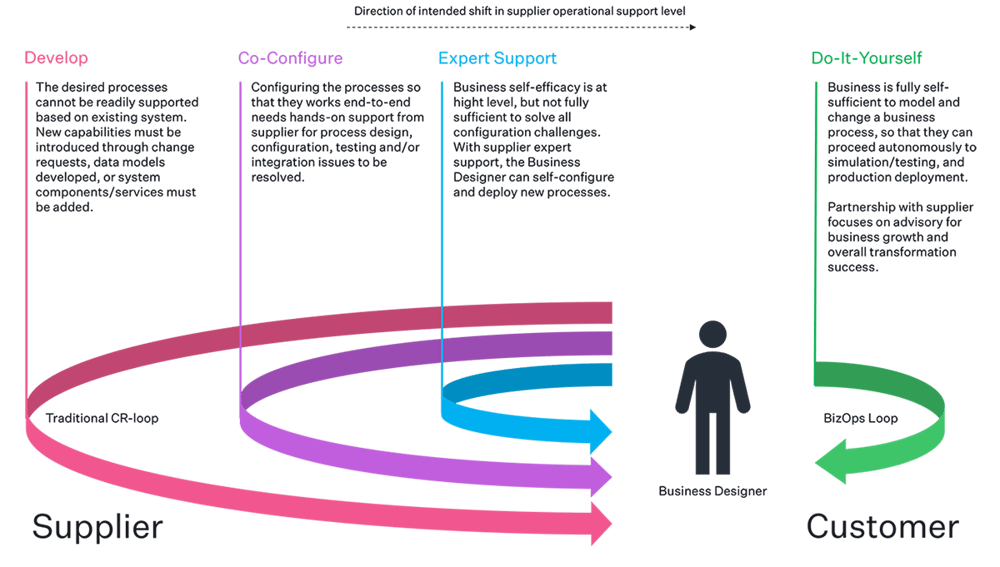We often remind our customers that the moment of deploying any digital commerce solution should not be perceived as the end, but rather as the beginning of the actual business transformation and growth phase. But we as suppliers must also ask ourselves, whether the solutions we implement for our customers are really capable of supporting easy adoption and flexible use in everyday operations to help them achieve their business objectives.
The Business Transformation Takes Off When Business Can Get Their Hands on the Production Solution
Because not everything can be foreseen at initial solution implementation, and customer and business needs change over time, there is a growing emphasis on building a solution that allows for agile business process design and fast time-to-markets (TTM). Business is not a constant – rather its offerings, targeted segments and customer journey design are in constant flux.
In addition to effective tooling for producing and updating core business assets such as product information, marketing content, customer information and messages, transactional documents... there is one aspect that has become a growing success requisite → business processes design capabilities.
-
Businesses may want to experiment with different go-to-customer models, such as Direct-To-Consumer (D2C), Wholesales (B2B), Retail partnering models (B2B2C) etc., for which process creativity and adaptability are needed.
-
Business will learn over time from their customers, or by spying on their competitors, what kind of service flows and experience are desired, for which process flexibility is needed.
-
And in today's difficult global context, business will be very keen to find means for streamlining operational processes and lifting operational efficiency, for which process optimization capabilities are needed.
Business Agility Instead of Vendor-locks and Change Requests: The Rise of BizOps
In recent years, there has been a growing interest in business systems that specifically focus on capabilities that allow on-the-fly changes to offering models, customer journey flows and underlying business rules. These solutions often rely on open standard business process modelling approaches, such as BPMN 2.0, for managing the business logic implemented in the IT system. Based on easy-to-use process modelling tools and proven process engines for execution, these solutions pride themselves to enable a "no-code BizOps" culture with dramatically shortened TTM and lower total cost of ownership (TCO) - a trend also lifted by McKinsey into their most recent technology outlook (August, 2022).
In contrast to DevOps (Development-to-Operations), BizOps (Business-to-Operations) promises business users that they can instantly launch new products and processes in DIY manner, without reverting to slow change requests and development loops, with high degrees of solution vendor dependencies.
B2B as Ideal Target
B2B in particular - because it is strongly driven by business process logic requirements on both sides of the customer relationship and throughout the partner network - is an ideal target for solutions that enable agile design and implementation of varying business processes and rules. The agility allows a company to drive their digital transformation through creative practice and gives the business the possibility for trialling different approaches.
A practical example of this would be that if a company is selling both through their own purchase channels and through retail partners then they could test who takes care of what size of quote requests and when. It can offer a possibility to optimise the sales process and make adaptions to how the most fundamental business practices are executed in the company.
A New Chapter in the Supplier-Customer Partnership
As digital solutions with in-built business self-efficacy and flexible business process design capabilities become more wide-spread, also the relationship and commercial model between the supplier and customer of digital business solutions will need to evolve.

Many suppliers will need to first move out of the far end of developing bespoke solutions with encoded business logic, to offering more configurable products. They should then seek to transfer more of their know-how and operational responsibilities to the customer business, and move more strongly into the role of providing a (BizOps) solution platform enhanced by professional services in the form of expert training and support as well as business advisory.
Vice versa, the customer's business organization will need to mature their operations and introduce new types of roles, such as those with skills in the form of a business designer, needed to make use of these new BizOps features. The gained agility of such BizOps solution models will mean that less time and money is spent on involving and coordinating with external parties for development and operations. But it also means that a greater stake of accountability for solution configuration and quality assurance are transferred from solution providers to the businesses themselves.
For suppliers, the BizOps future removes one traditional revenue stream, but it should add to the monetizable value of their base solution offering. For customers, business operation becomes more efficient, but also new competences are needed. In the end, it needs to be seen if both parties can find the mutual benefit to make this transition in the relationship desirable and sustainable. It may also be that BizOps is not the service and operational model seeked after by all customers, especially those with lower levels of digital maturity, limited capacities, or rather stable processes.
At Solteq we already maintain a wide portfolio of configurable digital commerce solutions. And we are willing to continue the dialog with our customers about their business operational needs and how to develop our offering for establishing a partnership model that allows us to succeed together.
If you wish to dive deeper into the subject, feel free to download our eBook: "Gearing Up For Digital B2B".










